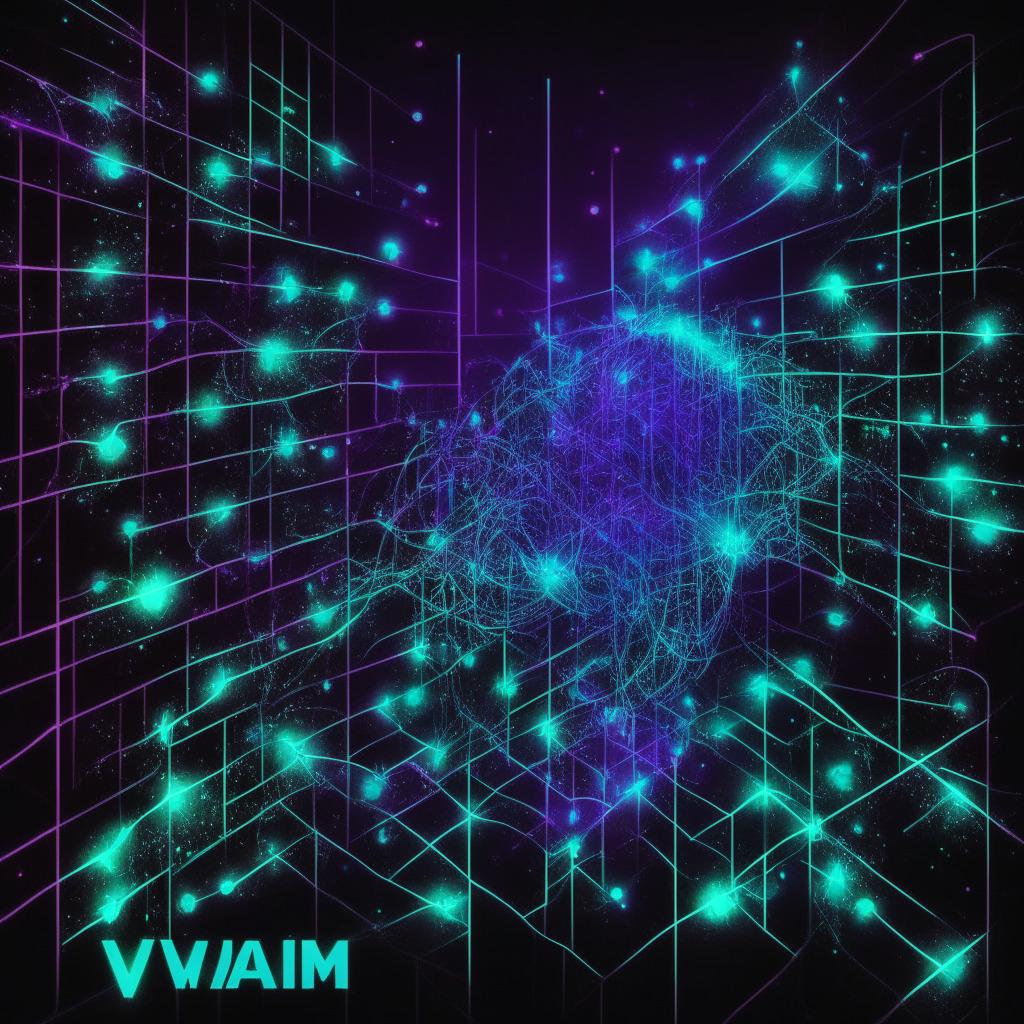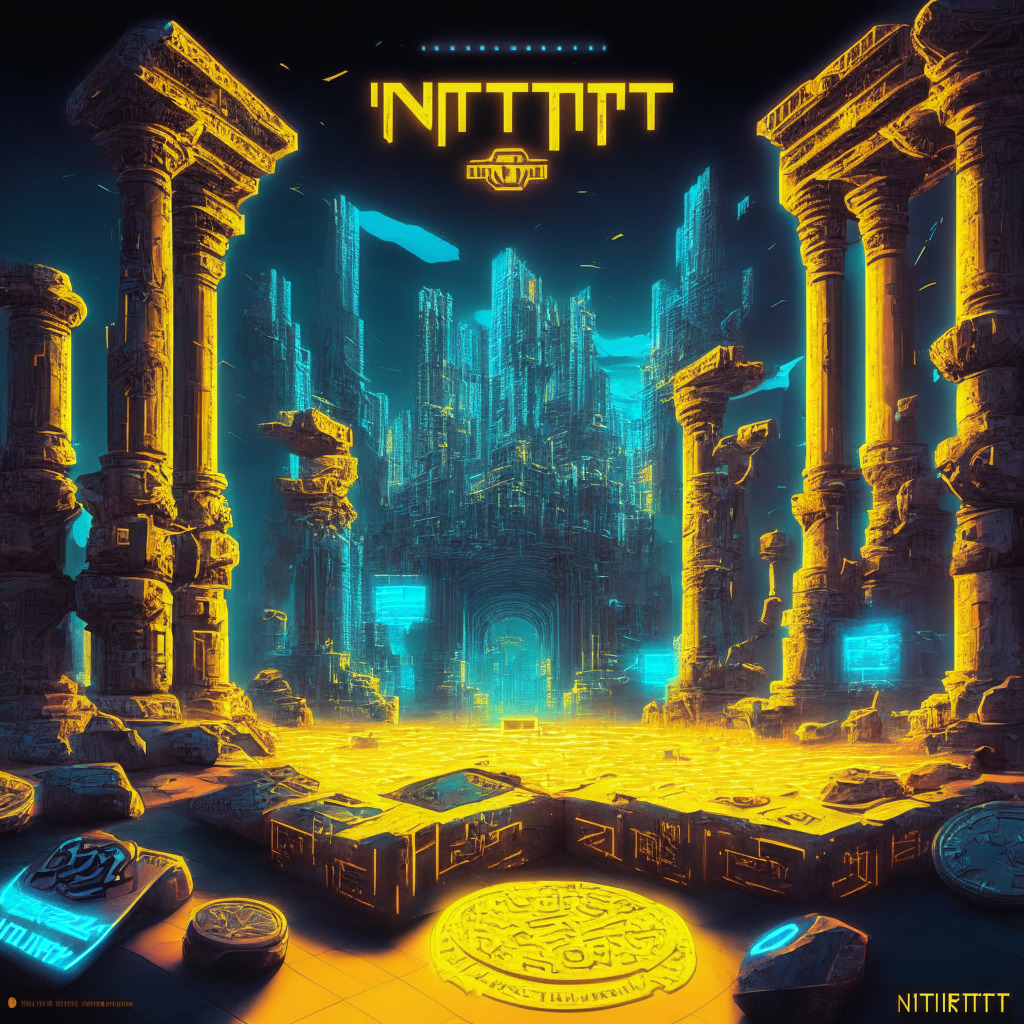“Dfinity is developing a system called the Internet Computer, aiming to shift the foundation of the blockchain realm. They plan to remove centralized systems and replace them with ‘canister smart contracts’, providing a decentralized alternative to services like Amazon Web Services. However, these smart contracts can pose serious risks if flawed.”
Search Results for: The Internet Computer
Digital Justice served Cold: Concern Over FTX Founder’s Limited Internet Access During Trial
“The case of FTX founder Sam Bankman-Fried, involving complications related to digital access for legal defense, questions traditional understanding of a fair hearing. Limited internet access and slow speeds have affected defense preparation, raising concerns about potential infringement on the right to a fair trial.”
Digital Rights in Jail: FTX Founder’s Legal Battle Raises Questions about Cryptocurrency, Justice, and Internet Access for Inmates
Legal defenders for FTX founder, Sam Bankman-Fried, are arguing for his temporary release or increased consultation dates, citing an infringed right to participate in his defense process through digital resources. This case highlights the possible need for digital inmate rights in the increasingly digital world of contemporary trials, especially in cryptocurrency-related matters. The balancing act between these digital access rights and potential risks of digital forensics manipulation represents a new legal battlefield.
China’s Crypto Clampdown vs Global Leanings: Divergent Paths in Blockchain Evolution
China continues its crackdown on crypto activities on Weibo, targeting more than 80 influential crypto personalities. Meanwhile, the IMF and FSB released policy recommendations to manage cryptocurrency-associated financial risks. In other developments, the DFINITY Foundation partners with Lugano’s municipality and Unstoppable Domains added .eth domain support to its messaging service.
Demystifying AI on Blockchain: A Pathway to Transparent and Trustworthy Tech Adoption
“The global rise of AI is impeded by transparency and trust issues, which could potentially be resolved by applying decentralized computation via blockchain technology. However, most blockchains lack sufficient infrastructure to support AI models as they demand substantial computational resources and data sets.”
Grill.chat Integrates EVM Wallets: Connecting Ethereum Identities and Expanding Crypto Communities
Grill.chat, a Subsocial-based chat app, has integrated Ethereum Virtual Machine (EVM) wallet compatibility, enabling users to chat using their Ethereum identities and send crypto via Polygon. This development attracts new Web3 projects and allows access to over 70 crypto-related chat rooms. Subsocial is a Polkadot parachain designed for social media applications.
Stablecoins, Politics, and Regulations: Navigating the Crypto Market’s Calm Before the Storm
The cryptocurrency market experienced a flat week, with Bitcoin and Ethereum remaining stable. Meanwhile, ICP and LDO faced losses, while TRON rallied. The growing crypto market attracts political involvement, and regulatory bodies emphasize the need for clear guidelines and vigilance.
Cardano Outshines Ethereum and Bitcoin in Daily Development: A Humorous Look at the Battle for Blockchain Supremacy
There is more daily development on Cardano, a smart contract platform, than on any other […]
Using Bitcoin’s Lightning Network for Offline Transactions: The Future or a Fallacy?
“LNMesh, a Florida-based startup, proposes the use of Bitcoin’s Lightning Network for transactions without internet. The solution utilizes local mesh networks for devices to connect directly, allowing for off-chain Lightning payments across nodes in an offline manner using Raspberry Pi computers.”
Navigating the Labyrinth of Bitcoin: An Asset Worth Understanding
“Bitcoin is the best performing asset for seven out of the last ten years, yet wealth advisors are still reluctant to support investments in this asset class. While Bitcoin’s predictable, finite supply can provide a buffer against inflation, its frequent value fluctuations present challenges. Nonetheless, it is a robust construct that can drastically reshape monetary transactions, making it an intriguing asset to watch.”
Cryptocurrency Scams: A Human Rights Crisis in Southeast Asia
The United Nations Human Rights Office warns of widespread crypto scams in Southeast Asia, where hundreds of thousands fall victim to fraudulent schemes and human rights violations. Victims are often educated and multilingual, exploited due to dire financial situations. Approximately 120,000 in Myanmar and 100,000 in Cambodia are reportedly ensnared in these scams.
Regulations In The Blockchain Age: A Closer Look Through the FTX Founder’s Trial
“Legal representatives for FTX founder Sam Bankman-Fried are unimpressed with US prosecutors’ handling of his upcoming trials. They argue their client needs more time to review millions of pages of case documents and constant internet access. Bankman-Fried faces serious charges for alleged fraudulent activities, affecting the ongoing narrative around regulations in the blockchain and cryptocurrency world.”
Navigating the Crypto Market amid Economic Uncertainty: Top Picks for Traders
“Expectations grow as Federal Reserve Chairman, Jerome Powell’s comments historically impact financial markets including cryptocurrencies. Amid this anticipation, recommended choices are Render, Sonik Coin, Immutable X, yPredict, and Internet Computer, notable for their robust fundamentals and encouraging technical analysis.”
Stellar Joins Bytecode Alliance: A Shift from EVM to Wasm in Blockchain Technology
“Stellar, a globally recognized payments network, has joined the Bytecode Alliance, with a mission to advance the development of WebAssembly (Wasm). Wasm, initially used for browser applications, offers unique resiliency, making it an attractive alternative to Ethereum’s Virtual Machine (EVM) for executing smart contracts. Ultimately, Stellar’s goal is to impact Wasm development standards to benefit the broader Blockchain community.”
Securing the Gatekeepers: Safeguarding Your Cryptocurrency Private Keys
“Private keys in the digital asset universe are secure gatekeepers, providing access to your prized cryptocurrencies and data. Secure storage methods include hardware wallets, paper wallets, encrypted USB drives, cold storage, cryptocurrency vault services, password managers, and key-splitting. Your choice should consider your specific needs, tech expertise, and risk tolerance.”
Cryptocurrency – Malware’s New Target: Understanding the Rising Foe in Digital Security
“Blackberry’s ‘Global Threat Intelligence Report’ outlines over 1.5 million thwarted cyberattacks from March to May; most targeted finance, healthcare, and government sectors. Malware like RedLine, designed to steal sensitive data such as credit card and cryptocurrency details, have risen in popularity, with groups like SmokeLoader, RaccoonStealer and Vidar being specifically aimed at commandeering systems for crypto mining or theft.”
Metaverse Losses and Blockchain Gaming: Navigating the Unchartered Waters of Cryptocurrency Integration
“Facebook’s Meta invests heavily in the metaverse despite losses, while in the blockchain gaming space, Alchemy: Battle for Ankhos integrates cryptocurrencies and AI. Meanwhile, Ultra, a crypto gaming startup, builds a tournament platform with its blockchain network for the thriving eSports industry.”
Unveiling Nodle’s Open-Source Approach – Revolutionizing IoT and Blockchain or a Security Nightmare?
“Nodle has shared its Web3 Bluetooth ‘nanocomputer’ sticker, an open-source initiative, to improve the IoT industry. The Nodle N1 can attach to any object and has various uses from logistics to tracking. However, potential bugs in Nodle’s firmware could expose numerous devices worldwide to risks, presenting security and privacy challenges. Despite cybersecurity concerns, this technology’s transformational potential is undeniable, offering a decentralized alternative for IoT networks.”
Blockchain’s Future: Unprecedented Transparency vs. Complex Privacy and Energy Concerns
“Blockchain technology, with its transparency and accountability, brings trust and confidence to numerous sectors, from finance to agriculture. However, significant challenges such as interoperability issues, energy consumption, and privacy concerns need immediate resolution for widespread adoption and realization of a decentralized utopia.”
Jameson Lopp: Navigating Bitcoin’s Delicate Balance Between Scale and Decentralization
Jameson Lopp, a prominent figure in the Bitcoin community, underscores the challenges Bitcoin faces in terms of scaling potential and functionality. He compares the situation to the early internet protocol, expressing concerns over potential “ossification” – a slow-changing, unwieldy network that may limit usage to large businesses, betraying the objective of decentralisation. He also addresses the controversy over Ordinals NFTs, and the notoriety he’s faced for his crypto advocacy.
Mixed Results in Crypto Market: Analyzing Gains, Losses, and Investor Perspectives
The cryptocurrency market showcases mixed results, with varied percentage gains and losses of numerous tokens. BTC and Ethereum experienced decent gains, while Ripple’s XRP, AAVE, and Crypto.com Coin saw slight declines. Investors should watch market trends and remain cautious before making financial decisions in the volatile crypto world.
AI’s Promising Future vs Ethical Implications: Striking the Right Balance for Sustainability
This article discusses the history and advancements of artificial intelligence (AI) and its integration into various aspects of our lives while addressing ethical and practical implications such as data privacy, biases, and job displacement. It highlights the importance of finding a balance between AI benefits and potential challenges.
AI Breathes New Life into Unfinished Beatles Song: A Look into Music’s Blockchain Future
Sir Paul McCartney announces the use of AI technology to extract John Lennon’s vocals from an old demo tape, allowing the completion of a “final” Beatles song to be released this year. Developed for Peter Jackson’s Beatles documentary, this AI tool successfully separates vocals from other audio elements in older recordings.
The Evolution of Computing: Quantum Leap, Ethical Dilemmas, and Edge Computing
The evolution of computing, from the analytical engine to quantum computers, has created a promising future in addressing complex problems, artificial intelligence, and machine learning. However, ethical concerns regarding privacy, bias, cybersecurity, and societal impact require responsible practices and frameworks to ensure technology benefits humanity.
Crypto Market Resilience: Price Recovery Amid SEC Allegations and Rising Bitcoin Dominance
Investors in major tokens like Solana, Cardano, and Polygon witnessed price stabilization and recovery after facing significant losses during the weekend’s sudden sell-off. The tokens’ development foundations issued statements countering allegations from the US SEC, boosting investor confidence and contributing to the price recuperation.
SEC’s Labels Impact ALGO and FLOW: Analyzing Market Reaction and Crypto Resistance
The SEC’s decision to label several cryptocurrencies as securities resulted in historic lows for Algorand (ALGO) and Flow (FLOW) on June 10. Despite opposition from projects like Solana, Cardano, and Polygon, the crypto market thrives, but ongoing debates may create volatility for investors.
Impact of SEC Lawsuits on Crypto Market: Analyzing Volatility and Affected Tokens
The SEC lawsuits against Coinbase and Binance have impacted crypto markets, causing certain tokens like SAND, ALGO, ADA, BNB, FIL, MATIC, CHZ, ATOM, and ICP to drop 10-18% in value. Skepticism surrounds the SEC’s reasoning, with claims of technical misunderstandings. Traders should tread cautiously with affected tokens as market fluctuations persist.
Solana vs SEC: Token Classification and Its Impact on Crypto’s Future
The Solana Foundation disagrees with the SEC’s classification of the SOL token as an unregistered security. Despite recent lawsuits against Binance.US and Coinbase, the Solana community remains unfazed. The ongoing debate around token classification is crucial in shaping the future of cryptocurrency and blockchain technology.
SEC Crackdown Effects on Crypto Volatility: Analyzing Market Reactions and Altcoin Impact
The SEC’s crackdown on Binance and Coinbase hasn’t significantly impacted Bitcoin’s options-based implied volatility metrics, as traders anticipated and accounted for the lawsuits. The recent actions primarily affect altcoins, while consequences on the value and performance of major cryptocurrencies, such as BTC and ETH, remain relatively minimal.
U.S. Congressional Hearing Explores Blockchain’s Future and Web3 Applications
In a recent House Energy and Commerce Committee Subcommittee meeting, Polygon Labs’ Ryan Wyatt discussed the potential of blockchain technology in creating a decentralized, transparent Web3, benefiting users and driving economic growth. He emphasized the need for a well-regulated blockchain ecosystem in the US to maintain competitiveness and ensure domestic technology industry thrives.
SEC’s Cryptocurrency Securities Criteria: Uncertainty and its Impact on the Industry
The US SEC’s recent lawsuits against Binance and Coinbase have raised concerns about criteria used to determine which cryptocurrencies are considered securities. Market capitalization of these “crypto securities” exceeds $100 billion, yet clear regulations are lacking, leading to uncertainty about the future of crypto in the United States.
AI in TV Writing: Creative Breakthrough or High-Tech Plagiarism? Pros, Cons, & Conflict
OpenAI’s ChatGPT generated a summary of existing “Black Mirror” episodes instead of a new plot, disappointing creator Charlie Brooker. As generative AI potentially impacts human writers, concerns about replacing writers and high-tech plagiarism arise, fueling debate in the entertainment industry.































